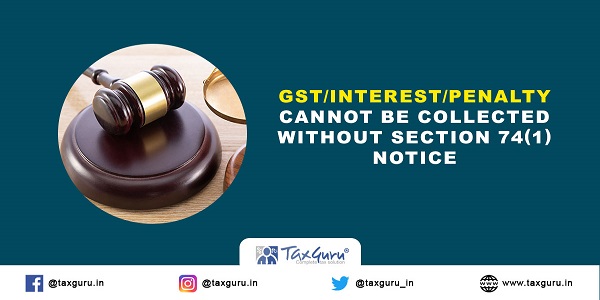GST Department Not Allowed Collecting Any Tax/Interest/Penalty without Issuance of Notice U/s. 74(1)
Telangana High Court gave a decision in the case of Deem Distributors Private Ltd Vs Union of India, in which GST department will not allowed to collect any Tax/Interest/Penalty without issuance of notice under section 74(1) of the Goods and Service Tax Act, 2017.
The high court held an investigation and it was divulge that the petitioner was receiving fake invoices from bogus suppliers or firms with an intention to pass on the Input Tax Credit, and it came to know that the credit was utilize by petitioner in a fraudulent manner without actually receiving any material. Then the respondent issued a notice to the petitioner regarding the Input Tax Credit that has availed by the petitioner on the basis of invoices that are received by the petitioner. Accordingly, the petitioner has to reverse the Input Tax Credit of Rs. 1,52,35,820/- which was availed as per the invoices. Addition to that, there was this 3rd respondent who sent a notice by saying there was tax liability of Rs. 1,17,35,822/- for the period from February,2018 to March,2018 and as per the notice the petitioner was guide to pay it, and if failed a show cause would be issued as per Section 74(1) of the Act.

The petitioner filed a case on the basis of that the petitioner is not liable to pay tax if there is no investigation was conducted and if conducted, until it is completed. Any decision made by department during the investigation then it will be the interim decision. If there is no enquiry would be taken then the petitioner is not liable to pay any tax.
So it was observed by the high court that the notice under section 74(1) of the Act will be issued by the proper officer or the officer in charge if he is of the opinion that the Input Tax Credit has been wrongly or fraudulently utilized by the person, and requiring him to that why he should not pay any tax or penalty which is given in the notice. But the tax payer has an option under section 74(5) of the Act that if he wants to pay the amount he can pay it, but it doesn’t give any power to respondent to ask for any interest or penalty or any liability from the tax payer person.
The decision was taken as if there is any inquiry is still in progress then no tax can be demanded, and the respondent cannot ask for any interest or penalty after the petitioner has received any notice. If any respondent does any kind of this act then the act will be inconsistent.
In this case the petition was allowed and the respondent were stopped from pressurizing the petitioner for making any payment of tax or liability without issuing a notice under section 74(1). The respondent were directed to refund the amount which was paid by petitioner with the interest of 7% p.a. from the date on which petitioner gave the money to the date of refund.
Author-CA.Ganesh Jagtap





